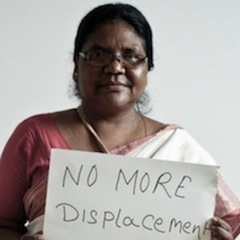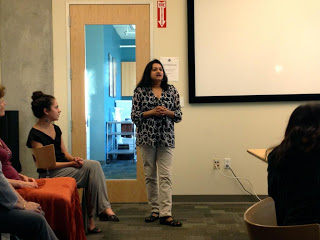A Ballad of Resistance: An evening with feminist film-maker, Leena Manimekalai
By Lauren Bellenie, WEA General Intern

Dayamani Barla was jailed last year to silence her anti-displacement activism.
Guest speaker, Preeti Mangala Sekar, ED of Narika, read a poem written by Leena called “Penalty.” The poem framed the public response to Leena’s poetry, including demands from some right wing voices, who shunned it as “pornographic” writing. The poem’s content highlighted the feelings and situations that arise when the only path to follow is one that is honest, yet perceived by some as inflammatory because it expresses and asserts female sexuality and power. Leena relates to this through her own unconventional life path and through the stories of human rights activists, especially women, that she documents in her films.On June 18th, friends of WEA, old and new, trickled into the David Brower Center to meet a special guest speaker, Indian social justice film-maker, poet and actress, Leena Manimekalai. Rucha Chitnis, WEA’s South Asia Program Director, welcomed everyone to the event and shared how indigenous women were on the frontlines of global resistance against landgrabs that threatened their ancestral homelands, and how films, such as Leena’s “Ballad of Resistance”, are an important vehicle to highlight the crucial role women play in social movements and defending human rights.

Leena sharing about her personal journey as a feminist film-maker
Dayamani explains in the film that the Munda tribe has been resilient to many attempted impositions over the years. She notes that this area represented resistance against British colonizers, long before the time of Gandhi. Though the fights have not always been easy, their persistence has afforded them their land rights on multiple occasions. Today, women are on the frontlines of these movements against land grabs from powerful forces. One moving scene in the film showed women from Nagri communities tearing down walls of government-santioned construction sites to make way for business and law schools, despite police presence. The women featured in the film echoed the sentiment, “We will give our lives but not our land.” Dayamani stands for the dignity, rights and identity of her community and the ancestry that constitutes the foundation for their relationship with “Mother Nature”.Leena screened “Ballad of Resistance”, which follows Dayamani Barla, India’s first indigenous female journalist from Jharkhand, who has centered her life on protecting ancestral lands occupied by tribal communities in her state. “Ballad of Resistance” offers a breath-taking view into the longterm social action against the external pressures of development facing indigenous communities in India. The film shows how Dayamani works tirelessly at the grassroots, documenting the struggle through her journalism and efforts to organize tribal communities to stand strong against corporate landgrabs for mining and other industrial development projects.

Anu Mandavilli introduces Leena
Leena’s films are creative and effective means to highlight human rights violations, as well as the agency of local communities to demand justice and dignity. When Dayamani was arrested in 2012 for two and a half months, supporters used Leena’s film as a means to raise awareness to free her. Attendees were so engaged in the discussion with Leena that it continued well past the scheduled finish time.Throughout the evening, the audience gained fascinating insights into Leena’s own life as a feminist artist and activist. During the question and answer portion, Leena shared how she began making films to document lives of people, who are left out of mainstream media and development processes. She explained that she would go to communities and document their story of oppression, and then the oppressors of that group would also want her to document their story as well.
Leena closed with a statement about our role in these issues as international allies. She encouraged our role as funders, given the sparse monetary sources available for NGOs and social movements in India and profoundly stated that “Indian resistance is at a challenging point, but we can give them hope and solidarity that they are not alone.”
Special thanks to activist, Anu Mandavilli and Friends of South Asia for partnering with WEA to host this gathering.
